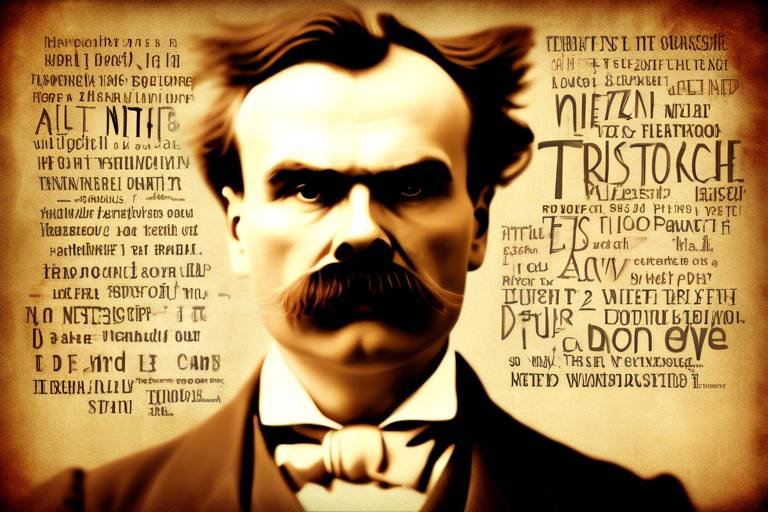Kant's Practical Reason - An Overview
Immanuel Kant, a towering figure in the realm of philosophy, introduced the concept of practical reason as a cornerstone of his moral philosophy. But what exactly does this mean? At its core, practical reason is the ability of individuals to make moral decisions grounded in rational thought, rather than being swayed by mere inclinations or desires. Imagine a compass that guides you through the murky waters of ethical dilemmas; that's what practical reason aims to be. It emphasizes the pivotal role of reason in shaping our ethical behaviors and choices, allowing us to navigate complex moral landscapes with clarity and purpose.
Kant argued that true morality stems from the ability to act according to principles that can be universally applied. This concept not only elevates our understanding of ethics but also places a significant responsibility on individuals to engage in rational deliberation when faced with moral choices. In a world where emotions often cloud judgment, Kant's framework serves as a refreshing reminder that our decisions should be rooted in rationality and a sense of duty. When we act according to practical reason, we not only uphold our own moral integrity but also contribute to a more just and equitable society.
The implications of Kant's practical reason extend far beyond the realm of philosophy. In our daily lives, we encounter situations that challenge our ethical beliefs and compel us to make decisions that reflect our values. Whether it's standing up for a friend in need or making choices that impact our community, practical reason equips us with the tools to assess our actions critically. It encourages us to ask ourselves, "Would I want everyone to act this way?" This rhetorical question, central to Kant's philosophy, invites us to consider the broader consequences of our actions and to strive for a sense of universality in our moral judgments.
As we delve deeper into Kant's practical reason, we will explore various facets of his moral philosophy, including the Categorical Imperative, the role of autonomy, and the ongoing relevance of his ideas in contemporary ethical discussions. By understanding these concepts, we can better appreciate the significance of practical reason in fostering human dignity, respect, and ethical integrity in our interactions with others.
- What is practical reason according to Kant?
Practical reason refers to the ability to make moral decisions based on rational thought rather than mere desire, emphasizing the importance of reason in ethical behavior.
- What is the Categorical Imperative?
The Categorical Imperative is a foundational principle in Kant's moral philosophy that instructs individuals to act only according to maxims that could be universally applied.
- How does Kant define autonomy?
Kant defines autonomy as the capacity to govern oneself and make moral decisions based on rational principles, highlighting the importance of self-governance in ethical actions.
- Why is Kant's philosophy still relevant today?
Kant's insights into practical reason continue to influence modern ethical discussions, providing a framework for evaluating moral dilemmas and encouraging rational approaches to decision-making.

The Nature of Practical Reason
Kant's concept of practical reason is a fascinating and essential element of his moral philosophy. It highlights the idea that human beings possess the unique ability to make moral decisions based on rational thought rather than being driven solely by their instincts or desires. Think about it—how often do we find ourselves torn between what we want to do and what we know is right? This internal struggle is where practical reason comes into play, serving as a guiding force that helps us navigate the murky waters of ethical dilemmas.
At its core, practical reason is about the capacity for individuals to engage in ethical reasoning. It allows us to evaluate our actions based on principles rather than mere inclinations. For example, when faced with a decision, we can ask ourselves: "What would happen if everyone acted this way?" This question reflects Kant's emphasis on the role of reason in ethical behavior. Instead of acting on impulse or societal norms, practical reason urges us to consider the broader implications of our choices.
Moreover, practical reason is not just an abstract idea; it has real-world implications. It empowers individuals to take charge of their moral lives and encourages them to act in accordance with their values. This capacity for self-governance is what sets humans apart from other beings. We are not merely at the mercy of our desires; we can reflect, deliberate, and choose to act in ways that align with our understanding of what is right.
However, it's important to recognize that practical reason is not infallible. While it provides a framework for moral decision-making, the application of reason can still be influenced by various factors, such as emotions, cultural backgrounds, and personal experiences. This complexity adds depth to the concept and reminds us that ethical decision-making is often a nuanced process. In this way, practical reason serves as both a guide and a challenge, prompting us to continuously refine our understanding of morality.
In summary, Kant's practical reason represents the remarkable capacity of individuals to make ethical choices grounded in rational thought. It emphasizes the importance of self-governance and the need to consider the broader implications of our actions. While it offers a robust framework for moral reasoning, it also acknowledges the complexities inherent in human decision-making. This balance between reason and the realities of life is what makes Kant's philosophy both profound and relevant, even in today's world.

The Categorical Imperative
The Categorical Imperative is not just a concept; it’s the very heart of Immanuel Kant’s moral philosophy. Imagine a compass that guides you through the murky waters of ethical decision-making. This principle asserts that moral actions should be based on maxims that can be universally applied. In simpler terms, it asks us to consider whether the rule guiding our actions could be adopted by everyone. If everyone acted in the same way, would it lead to a harmonious society or chaos? This is the essence of Kant's approach to ethics.
Kant introduces several formulations of the Categorical Imperative, but they all orbit around the same core idea: the necessity of universality. Let’s break this down further. The first formulation, known as the Formula of Universal Law, states that one should act only according to that maxim whereby you can, at the same time, will that it should become a universal law. This means that before you make a decision, you should ask yourself, "What if everyone did this?" If the answer leads to a contradiction or an undesirable outcome, then it’s likely not a moral action.
For example, let’s say you consider lying to get out of a sticky situation. If everyone lied whenever it suited them, trust would evaporate, and communication would break down. Thus, the act of lying fails the Categorical Imperative test, reinforcing the idea that our actions must be consistent with universal principles.
Now, let’s talk about why this universality is so crucial. Kant believed that moral principles must apply to all rational beings, not just a select few. This idea fosters a sense of equality and justice, ensuring that no one is above the moral law. It’s like a game where everyone plays by the same rules; fairness is maintained, and everyone knows what to expect from one another.
However, this strict adherence to universality has drawn its share of critiques. Some argue that it overlooks the complexities of human experiences and the contextual factors that influence moral decisions. Life isn’t always black and white, and sometimes, ethical dilemmas present shades of gray that Kant’s framework might not fully accommodate. For instance, consider a scenario where telling the truth could lead to significant harm. Critics contend that Kant's emphasis on universality may not adequately address such nuances.
These critiques raise an important question: can we really apply a one-size-fits-all approach to ethics? While Kant’s Categorical Imperative provides a robust framework, it may require some flexibility to account for the rich tapestry of human experiences. The challenge lies in balancing the ideal of universality with the realities of individual circumstances.
Another important aspect of the Categorical Imperative is the Formula of Humanity, which emphasizes treating individuals as ends in themselves rather than merely as means to an end. This principle advocates for respect and dignity in all human interactions. Think of it this way: every person has intrinsic worth, and using someone solely for personal gain devalues their humanity. Kant’s insistence on treating others with respect is a powerful reminder that ethical considerations must prioritize human dignity.
In summary, the Categorical Imperative serves as a guiding star in the realm of moral philosophy. Its emphasis on universality and respect for individuals lays a strong foundation for ethical behavior. While it faces critiques regarding its rigidity, the core principles it promotes encourage us to think critically about our actions and their implications for others. As we navigate the complexities of life, Kant’s insights continue to resonate, challenging us to strive for a moral compass grounded in reason and respect.
- What is the Categorical Imperative? The Categorical Imperative is a foundational principle in Kant's moral philosophy that guides ethical decision-making by emphasizing the need for universality in moral actions.
- How does the Categorical Imperative differ from hypothetical imperatives? Unlike hypothetical imperatives, which depend on personal desires or goals, the Categorical Imperative applies universally and is based on rational moral laws.
- Can the Categorical Imperative be applied in real-life situations? Yes, the Categorical Imperative can be applied by evaluating whether the maxims guiding our actions could be adopted universally without leading to contradictions or negative outcomes.

The Formula of Universal Law
The Formula of Universal Law is a central component of Kant's ethical framework, serving as a guiding principle for moral reasoning. At its core, this formulation emphasizes that one should act only according to maxims that can be universally applied. In simpler terms, before making a decision, we should ask ourselves: "Would it be acceptable for everyone to act this way?" This question is not merely academic; it serves as a litmus test for the morality of our actions. If the answer is no, then we must reconsider our choices.
Imagine a world where everyone acted on their personal desires without regard for others. It would be chaotic, wouldn't it? Kant believed that by adhering to the Formula of Universal Law, we create a framework that fosters consistency and predictability in moral behavior. This consistency is crucial for establishing trust and cooperation among individuals in society. It cultivates a sense of community where everyone is held to the same ethical standards, promoting fairness and justice.
To further illustrate this concept, consider the following example: suppose someone is contemplating lying to get out of a difficult situation. If they apply the Formula of Universal Law, they must ask themselves whether they would want everyone to lie whenever it suited them. The answer is likely no, as a society built on lies would crumble. Thus, the individual recognizes that lying is not a morally acceptable action under Kant's ethical framework.
However, while the Formula of Universal Law provides a robust foundation for ethical reasoning, it has faced criticism. Some argue that strict adherence to this principle may overlook the complexities of real-world situations. For instance, if a lie could save a life, should one still adhere to the universal maxim of truth-telling? This dilemma showcases the potential tension between universal principles and the nuanced nature of human experience.
In conclusion, the Formula of Universal Law invites us to engage in deeper reflection about our moral choices. It challenges us to consider the broader implications of our actions, ensuring that we strive for a moral code that respects the dignity of all individuals. By applying this formula, we not only uphold our responsibilities to ourselves but also to the society in which we live.
- What is the Formula of Universal Law?
The Formula of Universal Law is a principle in Kant's ethical framework that states one should act only according to maxims that can be universally applied.
- How does the Formula of Universal Law promote fairness?
It establishes a consistent ethical standard that applies to everyone, fostering trust and cooperation in society.
- Can the Formula of Universal Law address complex ethical dilemmas?
While it provides a strong foundation for moral reasoning, critics argue that it may not account for the nuances of specific situations.

The Importance of Universality
In the realm of Kant's moral philosophy, the concept of universality stands as a cornerstone that shapes our understanding of ethical behavior. At its core, universality asserts that moral principles should not be arbitrary or subjective; instead, they must apply to all rational beings without exception. Imagine a world where everyone adheres to the same moral guidelines—this is the essence of Kant's vision. By promoting the idea that our actions should be able to be willed as a universal law, Kant encourages us to think beyond our personal desires and inclinations.
Consider the implications of this principle in everyday life. When faced with a moral dilemma, asking ourselves whether we would want everyone to act in the same way can provide clarity. For instance, if we contemplate lying to get out of a situation, we should reflect: What if everyone lied in similar circumstances? The chaos that would ensue highlights the necessity of adhering to universal moral laws that foster trust and integrity in society.
Furthermore, the importance of universality promotes a sense of equality and justice. By applying the same moral standards to everyone, we ensure that no one is treated as a mere means to an end. This perspective is vital in a world where discrimination and inequality often prevail. Kant's emphasis on universality encourages us to recognize the inherent dignity of every individual, advocating for a society where everyone has the right to be treated with respect.
However, it is essential to acknowledge that while the idea of universality is compelling, it is not without its critiques. Some argue that strict adherence to universal principles may overlook the complexities and contextual factors that can influence moral decisions. For example, consider a scenario where helping someone might lead to unintended negative consequences for another. In such cases, the rigid application of universal laws might not account for the nuanced realities of human interactions.
In light of these critiques, it becomes crucial to find a balance between universality and contextual understanding. While Kant's framework provides a solid foundation for moral reasoning, it is also important to engage with the complexities of real-life situations. Thus, the challenge lies in applying these universal principles thoughtfully, ensuring that we maintain a commitment to ethical integrity while being sensitive to the unique circumstances that shape our decisions.

Critiques of Universality
While Kant's notion of universality is a cornerstone of his moral philosophy, it has not been without its critics. Detractors argue that the strict application of universal principles can often overlook the complexities of real-life situations. For instance, moral dilemmas frequently arise where the application of a universal law may lead to outcomes that are not only undesirable but also unjust. Imagine a scenario where adhering to a universal moral law could result in harm to an innocent person; this raises the question: should we prioritize a rigid principle over the well-being of individuals?
Critics like John Stuart Mill have suggested that Kant's categorical imperative fails to account for the nuances involved in ethical decision-making. They argue that moral reasoning is often context-dependent, and a one-size-fits-all approach may lead to oversimplified conclusions. The tension between universal maxims and particular circumstances can create a moral quagmire, where the right course of action is not always clear-cut. This is particularly evident in cases involving conflicting duties, where following one moral law may necessitate the violation of another.
Furthermore, some philosophers contend that Kant's emphasis on rationality may inadvertently dismiss the emotional and relational aspects of moral decision-making. Emotions, after all, play a significant role in how we perceive and respond to ethical situations. By prioritizing rational thought, Kant's framework may overlook the importance of empathy, compassion, and the intricate web of human relationships that shape our moral landscape.
To illustrate these critiques, consider the following table that outlines key arguments against the universality of Kant's ethical framework:
| Critique | Description |
|---|---|
| Contextual Nuance | Universal principles may not adequately address the complexities of specific situations. |
| Emotional Oversight | Kant's focus on rationality may neglect the role of emotions in ethical decision-making. |
| Conflicting Duties | Situations may arise where adhering to one moral law conflicts with another. |
Ultimately, while Kant's framework provides a robust foundation for moral reasoning, it is essential to recognize its limitations. The critiques surrounding universality remind us that ethics is not merely a matter of applying abstract principles but rather a dynamic interplay of reason, emotion, and context. As we navigate the complexities of moral dilemmas, embracing a more flexible approach that considers both universal laws and specific circumstances may lead to more just and compassionate outcomes.
- What is Kant's Categorical Imperative? The Categorical Imperative is a foundational principle in Kant's moral philosophy that asserts one should act only according to maxims that could be universally applied.
- Why is autonomy significant in Kant's ethics? Autonomy is crucial because Kant believes that true moral actions arise from self-governance and the ability to act according to rational principles.
- What are some criticisms of Kant's ethical framework? Critics argue that Kant's strict adherence to universality may overlook contextual factors, emotional considerations, and the complexity of conflicting duties.

The Formula of Humanity
Kant's second formulation of the Categorical Imperative, known as the Formula of Humanity, is a profound principle that emphasizes the inherent worth of every individual. According to Kant, we must treat others not merely as means to an end but as ends in themselves. This concept is pivotal in understanding the ethical treatment of individuals and promotes a culture of respect and dignity. Imagine walking through a bustling city where every person you encounter is treated with the utmost respect, valued for their unique contributions to society. This is the essence of the Formula of Humanity.
The notion of treating individuals as ends in themselves compels us to recognize their intrinsic value. It challenges us to reflect on our interactions and consider whether we are respecting the autonomy and dignity of those around us. For instance, in a workplace setting, this principle urges employers to treat employees not just as tools for productivity but as individuals with their own goals, aspirations, and rights. When we embrace this perspective, we foster an environment where everyone feels valued and empowered.
Furthermore, the Formula of Humanity serves as a powerful reminder against exploitation. When we view others merely as means to achieve our own objectives, we risk dehumanizing them. This perspective can lead to unethical practices, such as manipulation or coercion. Kant's ethical framework calls for a shift in how we perceive our relationships, advocating for interactions based on mutual respect and understanding. In essence, it encourages us to ask ourselves: Are we honoring the humanity of those we interact with?
To illustrate this point further, consider the following scenarios:
- In Personal Relationships: Treating friends and family with care and respect, valuing their opinions and feelings.
- In Business: Ensuring that business practices are fair and just, providing employees with equitable treatment and opportunities for growth.
- In Society: Advocating for human rights and social justice, recognizing the dignity of all individuals, regardless of their background.
Ultimately, the Formula of Humanity is not just a theoretical concept; it is a call to action. It invites us to examine our moral compass and to strive for a world where every individual is treated with the respect and dignity they deserve. By embracing this principle, we can contribute to a more just and equitable society, where the value of each person is recognized and celebrated.
- What is the Formula of Humanity? It is a principle in Kant's ethics that emphasizes treating individuals as ends in themselves, not merely as means to an end.
- Why is the Formula of Humanity important? It promotes respect, dignity, and ethical treatment of individuals, challenging exploitation and dehumanization.
- How does this formula apply in real life? It encourages us to value personal relationships, fair business practices, and advocate for social justice.

The Role of Autonomy
Kant's philosophy places a tremendous emphasis on the concept of autonomy, which he considers essential for moral decision-making. But what does autonomy really mean in this context? At its core, autonomy refers to the capacity of individuals to govern themselves, to make choices based on reason rather than external influences or mere desires. Imagine a ship sailing the seas; autonomy is the captain at the helm, steering the vessel based on a well-thought-out course rather than being tossed about by the winds of circumstance.
Kant argues that true moral actions stem from this self-governance. When individuals act autonomously, they are not just following orders or societal norms; instead, they are engaging in a process of rational deliberation. This means weighing their options, considering the implications of their actions, and ultimately making choices that align with moral laws they have imposed upon themselves. In this way, autonomy is not just about freedom; it’s about responsibility. It’s about recognizing that you are the architect of your own ethical framework.
However, autonomy is not without its challenges. Various philosophical critiques raise important questions about the feasibility of complete autonomy. For instance, how much of our decision-making is influenced by external factors such as societal expectations, cultural norms, or even emotional states? Are we truly free to make autonomous choices, or are we often swayed by the currents of our environment? These questions lead to a deeper exploration of what it means to be autonomous in a complex world.
To better understand the role of autonomy in Kant's ethical framework, let's consider the following key points:
- Self-Imposed Moral Laws: Kant believes that moral laws must be self-imposed through rational deliberation. This reinforces the idea that individuals are responsible for their ethical choices and actions.
- Influence of External Factors: Critics argue that societal pressures and external influences can compromise an individual's ability to act freely, raising questions about the true nature of autonomy.
- Responsibility and Accountability: With autonomy comes the weight of responsibility. Individuals must be held accountable for their choices, as they are the ones who determine their moral path.
In conclusion, autonomy is a cornerstone of Kant's moral philosophy, underscoring the importance of self-governance in ethical decision-making. While challenges to this concept exist, the essence of autonomy remains a powerful motivator for individuals striving to act morally. It invites us to reflect on our decisions and encourages us to take ownership of our actions, fostering a sense of integrity and purpose in our lives.
- What is autonomy in Kant's philosophy? Autonomy refers to the ability of individuals to govern themselves and make moral decisions based on rational thought rather than external influences.
- Why is autonomy important for moral decision-making? Autonomy is crucial because it allows individuals to act according to self-imposed moral laws, fostering responsibility and accountability.
- What challenges does autonomy face? Autonomy is challenged by external factors such as societal pressures, cultural norms, and emotional influences that may compromise an individual's ability to make free choices.

Autonomy and Moral Law
This article explores the concept of practical reason as articulated by Immanuel Kant, its significance in moral philosophy, and its implications for ethical decision-making and human autonomy.
Kant's practical reason refers to the capacity of individuals to make moral decisions based on rational thought rather than mere inclination or desire, emphasizing the role of reason in ethical behavior.
Central to Kant's moral philosophy, the Categorical Imperative serves as a foundational principle that guides moral actions, asserting that one should act only according to maxims that could be universally applied.
This formulation of the Categorical Imperative emphasizes the necessity of acting in a way that one's actions could be willed as a universal law, promoting consistency in moral reasoning.
Universality in Kant's ethics underscores the idea that moral principles must apply to all rational beings, fostering a sense of equality and justice in ethical considerations.
Critics argue that strict adherence to universality may overlook contextual factors, suggesting that moral decisions can be more nuanced than Kant's framework allows.
Kant's second formulation highlights the importance of treating individuals as ends in themselves, advocating for respect and dignity in all human interactions and rejecting exploitation.
Kant emphasizes the significance of autonomy in moral decision-making, positing that true moral actions stem from self-governance and the ability to act according to rational principles.
Kant argues that moral laws must be self-imposed through rational deliberation, reinforcing the idea that individuals are responsible for their ethical choices and actions. This concept of autonomy is not merely about freedom in the conventional sense; it is about the capacity to legislate moral law for oneself. In other words, when we act autonomously, we are not just following external commands or societal norms; we are engaging in a process of rational reflection where we consider the moral implications of our actions.
To illustrate this, think of autonomy as a compass that guides us through the complex terrain of moral decision-making. Just as a compass points north, our rational deliberation helps us navigate the moral landscape, ensuring that we do not stray off course due to fleeting desires or external pressures. When we impose moral laws upon ourselves, we acknowledge that we have a duty to uphold these principles, thus fostering a sense of moral integrity.
Moreover, Kant’s notion of autonomy is closely tied to the idea of moral responsibility. When individuals recognize that they have the power to determine their moral actions, they also accept the consequences that come with those choices. This dual aspect of freedom and responsibility is crucial for understanding the ethical implications of autonomy. It challenges us to think critically about our decisions and to hold ourselves accountable in a world where ethical dilemmas often arise.
However, it’s essential to recognize that autonomy does not exist in a vacuum. In practice, individuals may encounter various influences that challenge their ability to make autonomous choices. Factors such as societal expectations, cultural norms, and personal biases can all impact one's capacity to act freely. This brings us to the heart of Kant's argument: while autonomy is paramount, it is also vital to engage in continuous self-reflection to ensure that our decisions genuinely stem from rational deliberation rather than external coercion.
Kant's insights into practical reason continue to influence modern ethical discussions, providing a framework for evaluating moral dilemmas and promoting a rational approach to ethical decision-making.
- What is Kant's practical reason?
Kant's practical reason refers to the ability of individuals to make moral decisions based on rational thought rather than mere inclination or desire.
- What is the Categorical Imperative?
The Categorical Imperative is a foundational principle in Kant's moral philosophy that guides moral actions, asserting that one should act according to maxims that could be universally applied.
- Why is autonomy important in Kant's ethics?
Autonomy is crucial in Kant's ethics because it emphasizes the responsibility of individuals to legislate moral laws for themselves through rational deliberation.
- What challenges does autonomy face?
Autonomy can be compromised by external influences such as societal pressures and cultural norms, which may affect an individual’s ability to act freely.

Challenges to Autonomy
Kant's notion of autonomy is undeniably fascinating, but it doesn't come without its fair share of challenges. One might wonder, can we truly be autonomous in a world filled with external influences? The idea of autonomy suggests that individuals should be able to make decisions free from external coercion, but the reality often tells a different story. For instance, societal norms, cultural expectations, and even economic pressures can heavily influence our choices, leading us to question whether we are genuinely acting out of our own volition or simply responding to external stimuli.
Consider the impact of social media in today's digital age. Are we making autonomous choices about what to post or share, or are we simply conforming to trends and expectations set by others? This phenomenon raises a critical point: the line between autonomy and social influence can be incredibly blurry. When individuals feel compelled to act a certain way to fit in or gain approval, their autonomy can be compromised, leading to ethical dilemmas that Kant's framework may not fully address.
Moreover, the complexities of modern life often present situations where individuals face conflicting duties. For example, a person may feel a strong moral obligation to care for a family member while simultaneously feeling the need to advance their career. This tug-of-war can create a paradox where the individual struggles to exercise autonomy in making ethical choices. The question then arises: how does one navigate such competing demands while remaining true to their rational principles?
To illustrate this further, let’s consider a table that outlines some common factors that challenge autonomy in decision-making:
| Factor | Description |
|---|---|
| Societal Norms | Expectations set by culture that influence behavior. |
| Peer Pressure | Influence from friends or social groups that can sway decisions. |
| Economic Constraints | Financial limitations that restrict choices and actions. |
| Emotional Bonds | Relationships that can create obligations and affect autonomy. |
These factors highlight the intricate web of influences that can complicate the exercise of autonomy. While Kant emphasizes the importance of self-governance and rational deliberation, it’s essential to recognize that real-life scenarios often involve a myriad of pressures that can cloud judgment. This complexity begs the question: can true autonomy exist in a society where external influences are so pervasive?
In conclusion, while Kant's framework provides a robust foundation for understanding autonomy, it is essential to critically engage with the challenges that arise in practice. The interplay between personal freedom and external influences necessitates a nuanced approach to ethical decision-making, one that acknowledges the realities of human experience while striving for the ideals of rational autonomy.
- What is Kant's view on autonomy? Kant believes that autonomy is the ability to make moral decisions based on rational thought, free from external influences.
- How do external factors affect autonomy? External factors like societal norms, peer pressure, and economic constraints can significantly influence an individual's ability to make autonomous choices.
- Can true autonomy exist in modern society? While Kant argues for the importance of autonomy, the complexities of modern life challenge the feasibility of complete autonomy.

Practical Reason in Contemporary Ethics
In today's fast-paced world, where ethical dilemmas seem to pop up like mushrooms after rain, Immanuel Kant's insights into practical reason provide a refreshing lens through which we can evaluate our moral choices. Kant's emphasis on rationality over mere inclination resonates with many who are grappling with the complexities of modern ethical issues. After all, how often do we find ourselves torn between personal desires and what we know to be right? In this context, practical reason becomes not just a philosophical concept but a vital tool for navigating the murky waters of contemporary ethics.
Kant's framework encourages us to engage in a process of rational deliberation when faced with moral decisions. This involves asking ourselves whether our actions could be universalized—could we will that everyone acts in the same way? For instance, consider the ethical implications of lying. If we justify a lie for personal gain, we must confront the uncomfortable truth that if everyone lied, trust would erode, and society would crumble. Thus, Kant's approach fosters a sense of accountability, urging individuals to reflect on the broader implications of their actions.
Furthermore, Kant's notion of autonomy plays a pivotal role in contemporary discussions about ethics. In an age where external influences can easily sway our decisions—from social media to peer pressure—Kant's insistence on self-governance is particularly relevant. It challenges us to consider whether our choices are genuinely our own or merely reactions to societal expectations. This inquiry is crucial because it directly impacts our moral responsibility. If we are not acting autonomously, can we be held accountable for our actions?
The application of Kantian ethics is not limited to personal dilemmas; it extends into larger societal issues, such as justice, equality, and human rights. For example, in discussions about social justice, Kant's principle of treating individuals as ends in themselves encourages us to advocate for policies that respect the dignity of all people. This perspective can be seen in movements aimed at promoting equity and fighting discrimination, where the emphasis is placed on recognizing each person's inherent worth.
However, while Kant's practical reason provides a robust framework, it is not without its challenges. Critics argue that strict adherence to universal principles may overlook the nuances of specific situations. For instance, consider the ethical dilemmas faced by healthcare professionals during a crisis, such as a pandemic. Decisions may need to be made quickly, where the ideal of universalizability might clash with the urgent need to save lives. Here, the balance between Kantian ethics and situational ethics becomes a hot topic of debate.
In conclusion, Kant's practical reason remains a cornerstone of ethical thought in contemporary society. It invites us to engage in thoughtful reflection about our moral choices, emphasizing the importance of rationality, autonomy, and respect for human dignity. As we navigate the complexities of modern life, Kant's insights remind us that our ethical decisions are not just personal; they have the power to shape the world around us. So, the next time you find yourself facing a moral dilemma, take a moment to reflect: Are you acting out of reason, or are you simply following your inclinations?
- What is practical reason according to Kant?
Practical reason refers to the ability to make moral decisions based on rational thought rather than mere desires or inclinations.
- How does the Categorical Imperative relate to practical reason?
The Categorical Imperative serves as a guiding principle for moral actions, asserting that one should act only according to maxims that could be universally applied.
- Why is autonomy important in Kant's ethics?
Autonomy is crucial because it emphasizes that true moral actions stem from self-governance and the ability to act according to rational principles.
- What are some criticisms of Kant's ethical framework?
Critics argue that Kant's strict adherence to universality may overlook contextual factors, suggesting that moral decisions can be more nuanced than his framework allows.
Frequently Asked Questions
- What is practical reason according to Kant?
Kant's concept of practical reason refers to our ability to make moral choices based on rational thought rather than just following our desires. It's about using our intellect to guide our ethical behavior, ensuring that our decisions are grounded in reason.
- How does the Categorical Imperative function in Kant's philosophy?
The Categorical Imperative is a key principle in Kant's moral philosophy. It suggests that we should act only according to maxims that we would want to become universal laws. This means that our actions should be consistent and applicable to everyone, promoting fairness and justice.
- What is the significance of universality in Kant's ethics?
Universality is crucial in Kant's ethical framework. It emphasizes that moral principles should apply equally to all rational beings. This concept fosters a sense of equality and justice, ensuring that no one is treated as merely a means to an end.
- Are there criticisms of Kant's emphasis on universality?
Yes, some critics argue that Kant's strict focus on universality may ignore the complexities of real-life situations. They suggest that moral choices can be more nuanced and that context should play a role in ethical decision-making.
- What does the Formula of Humanity entail?
Kant's Formula of Humanity underscores the importance of treating individuals as ends in themselves. This means respecting the dignity and worth of every person, rejecting any form of exploitation or manipulation in our interactions.
- Why is autonomy important in Kant's moral philosophy?
Autonomy is central to Kant's view of moral decision-making. He argues that true moral actions arise from self-governance and the ability to act according to rational principles. This highlights our responsibility for our ethical choices.
- What challenges exist regarding autonomy in Kant's framework?
Various philosophical critiques raise concerns about the feasibility of complete autonomy. Factors like societal pressures and external influences can compromise an individual's ability to make fully free choices, questioning the practicality of Kant's ideal.
- How does Kant's practical reason apply to contemporary ethics?
Kant's insights into practical reason continue to shape modern ethical discussions. His framework helps us evaluate moral dilemmas and encourages a rational approach to making ethical decisions in today's complex world.



















